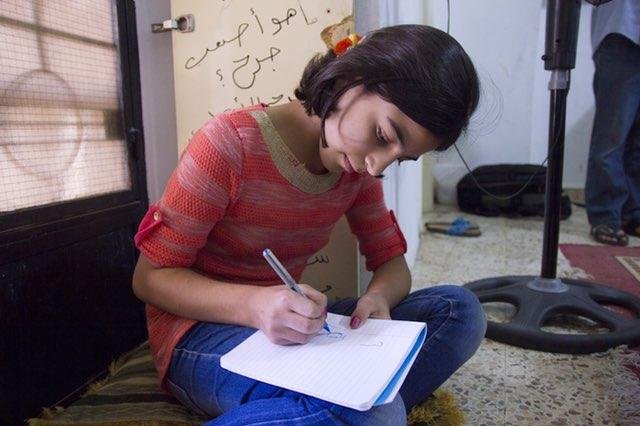Heba, 14, fled her home in Daraa, Syria, with her family to Lebanon. She attended an informal education center for a year before gaining a place in a public school running a second shift for refugees. Photo by Tabitha Ross/Theirworld
April 5 (UPI) -- The headline pledge from the Syria aid conference last year was to get every Syrian refugee child in Jordan, Lebanon and Turkey into school.
Members of the international community gathered in London in February 2016 and promised that 1 million Syrian children would start attending school in 2017. Donors pledged more money than at any other one-day event in history.
Since then, the horrific Syrian conflict has entered its seventh year, with no signs of ending. The education and future of Syrian children have been among the war's biggest collateral damages.
This week, 70 delegations are coming together in Brussels for the second "Supporting Syria and the Region" conference. They will assess where the international community stands in fulfilling commitments made at the last conference. They will also review existing delivery efforts and agree upon additional resources to meet the changing needs of Syrian school-age children.
Last year's efforts did make a tangible difference. Today over half of all Syrian refugee children are able to attend a school and begin to build their futures. But many others – approximately 530,000 children – have yet to set foot in a classroom. We want to get the remaining Syrian refugee children back into school where they belong.
I met 14-year-old Heba in late 2016 when she had just transitioned from an informal school in Lebanon – where she caught up on some of her lost academic years – to a well-performing public school. Heba is among the fortunate children who are part of the second shift system in Lebanon, which makes space for Syrian refugees.
Like many Syrian children, Heba has endured many interruptions to her schooling after fleeing the frequent air attacks on her hometown of Daraa, Syria. There are many others like her, who have not yet entered schools, leaving them vulnerable to child marriage, child labor, radicalization and other forms of exploitation.
We want to see the remaining Syrian refugee children in school, where they belong.
Born into war
It is unimaginable that Syrian children born since war broke out in 2011 have never experienced peace in their country – a country abundant in beauty, history and culture.
They only know that their lives are riddled with danger, with no prospect of peace in sight. News from Syria is increasingly overshadowed by other unfolding conflicts, leading to less international attention. Public donations have plunged amid strained peace negotiations.
So what chance do children born in wartime have to navigate a normal childhood and not lose the chance to build skills and learning for their future?
We know all too well that education is the best investment to be made in a child's future. Given the unabated Syrian crisis, we need to plan and deliver innovative ways to provide education in emergencies.
For every Syrian child, going back to school opens up his or her world to choices. It can be the difference between hope and despair, the gap between knowledge and ignorance, and the divide between those who are equipped to rebuild their country and those who will become aid-dependent.
Keeping promises
At the children's charity Theirworld, we are particularly concerned that this promise might be lost before the current school year concludes. We want to ensure that the promised aid reaches the children who need it.
Not everything is progressing as smoothly as hoped. In the past 14 months, the global political landscape has gone undergone dramatic changes and it now seems certain that some countries' foreign aid budgets will be reduced.
We want action from world leaders to ensure that the remaining children can start school in the coming school year. To help achieve this goal we are pushing for greater accountability and transparency in education funding. It is vital that all parties involved can see where the money is going so we can identify the gaps in funding and plan ahead.
There are currently no figures for the amount committed to Syrian refugee education for 2017, how this money will be spent or when and how it will be delivered. This makes it impossible for national governments and partners on the ground to plan effectively. It also leads to a lack of coherent strategy to ensure that funding is in place for the children to be admitted to schools by the end of this academic year.
Through the #YouPromised campaign, Theirworld aims to put pressure on world leaders to keep their pledge to fund education for Syrian refugee children.
Further, the Global Business Coalition for Education, of which I am the executive chair, has gathered pledges from the corporate sector and is working hard to deliver private-sector partnerships.
We want to see the needs of all school-age children met immediately. We are also calling for the agenda of the conference to include investment for early learning and development for under-5s. There is solid evidence that investing in children under the age of 5 produces the highest rates of return for any investment in education.
There is no time to waste. Every missed year of school adds to boys' and girls' lost childhoods. It is imperative for the children of Syria and the credibility of the international community that we are focused and transparent in our efforts.
Unlike emergency humanitarian aid, education needs planning. The gathering in Brussels can provide the foundation for a concrete education plan for the young citizens of Syria living outside the country.
Sarah Brown is president of Theirworld, a British charity working to expand education opportunities for Syrian refugee children. This article originally appeared on Refugees Deeply, and you can find the original here. For important news about the global migration crisis, you can sign up to the Refugees Deeply email list.
![]()















